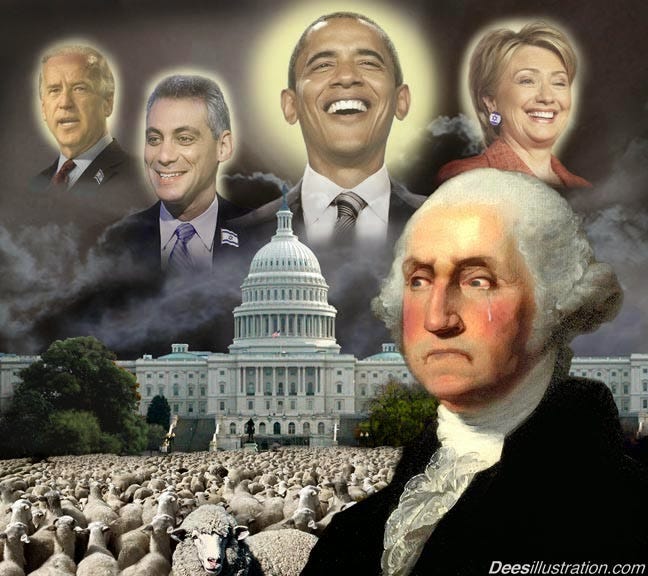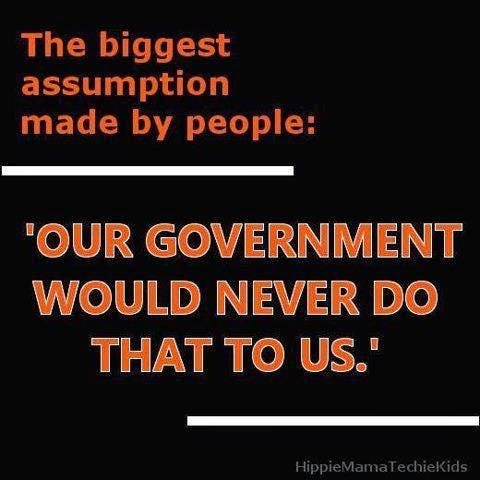Former NSA officials: AMERICA has turned into Stasi Germany or Soviet Union

Senior NSA executive Thomas Drake is an expert on spying in Stasi Germany … having studied it for years.
Drake told Washington’s Blog that the U.S. has adopted the Stasi model:
“Collect it all, know it all” the NSA's model is actually the Stasi model. It’s not just know everything; we have to be able to keep everything that we want to know, even if we don’t know it yet.
It’s a collect it all first mentality … and then we’ll get to know it all. I call it “feeding the beast”.
I keep shuddering because I’m intimately familiar with the East German surveillance state mentality.
A lieutenant colonel for the Stasi East German’s – based upon his experience – agrees. And German Chancellor Angela Merkel – who grew up in Stasi Germany – says the NSA is exactly the same. Top American constitutional experts also say that the Obama and Bush administration are worse than the Stasi East Germans.
A video of Congress holding hands, singing, “We Shall Overcome” may make you want to vomit.
After all, which of these members of Congress actually support the violation of American civil and constitutional rights on a consistent basis? ALL OF THEM!
Senior NSA official Bill Binney – the senior technical director within the agency who headed NSA’s global digital data gathering program and managed thousands of NSA employees – is an expert on Soviet spying.
Binney spent decades studying – and trying to counter – the repressive Soviet program of mass surveillance.
Binney says that – after 9/11 – America implemented the same type of system used by the Soviets and other authoritarian regimes:
You’ve got the NSA doing all this collecting of material on all of its citizens – that’s what the SS, the Gestapo, the Stasi, the KGB, and the NKVD did.
Postscript: Unfortunately, it’s not just spying …
In the decade after 9/11, the U.S. used specialized communist torture techniques specifically aimed at extracting false confessions.
Under Obama, whistleblowers and dissidents are treated as ruthlessly as in the Soviet Union.
When bad government policy leads to bad results, the U.S. government does what the Soviets did: manipulate the data.
The Soviets had Pravda … similarly, propaganda is now being used within the U.S. The U.S. government pumps out massive amounts of propaganda through the mainstream and “gatekeeper” alternative media, movies, video games, and other venues.
The American economy has gone from capitalism to socialism … at least for the fatcats.
http://www.washingtonsblog.com/2014/06/experts-communist-spying-u-s-engaged-communist-type-spying.html
Here's four ways mass surveillance is destroying our economy:
1.) Creativity – A Prime Driver of Prosperity – Requires Privacy
The Information and Privacy Commissioner of Ontario, Canada – Ann Cavoukian, Ph.D. – noted last month:
Privacy is Essential to … Prosperity and Well-Being
• Innovation, creativity and the resultant prosperity of a society requires freedom;
• Privacy is the essence of freedom: Without privacy, individual human rights, property rights and civil liberties – the conceptual engines of innovation and creativity, could not exist in a meaningful manner;
• Surveillance is the antithesis of privacy: A negative consequence of surveillance is the usurpation of a person’s limited cognitive bandwidth, away from innovation and creativity.
The Financial Post reported in February: “Big Brother culture will have adverse effect on creativity, productivity“.
Christopher Lingle – visiting professor of economics at ESEADE, Universidad Francisco Marroquín – agrees that creativity is a key to economic prosperity.
Edward Snowden said last year:
The success of economies in developed nations relies increasingly on their creative output, and if that success is to continue we must remember that creativity is the product of curiosity, which in turn is the product of privacy.
Silicon Valley is currently one of the largest drivers of the U.S. economy. Do you think Bill Gates and Steve Jobs could have tinkered so creatively in their garages if the government had been watching everything they do?
Everyone who has every done anything creative knows that you need a little privacy to try different things before you’re ready to go public with it. If your bench model, rough sketch or initial melody is being dissected in real time by an intrusive audience … you’re not going to be very creative.
2.) The Free Flow of Information Requires Privacy
Moreover, surveillance hampers the free flow of information as many people begin to watch what they say. The free flow of information is a core requisite for a fast-moving economy … especially an information economy, as opposed to economies focused on resource-extraction or manufacturing.
As quoted above, the White House states:
Assuring the free flow of information [is] essential to American and global economic prosperity, security, and the promotion of universal rights.
Mass surveillance makes people more reluctant to share information … and thus hurts the economy.
3.) Mass Surveillance Hurts Productivity
Top computer and internet experts say that NSA spying breaks the functionality of our computers and of the Internet. It reduces functionality and reduces security by – for example – creating backdoors that malicious hackers can get through.
Remember, American and British spy agencies have intentionally weakened security for many decades. And it’s getting worse and worse. For example, they plan to use automated programs to infect millions of computers.
How much time and productivity have we lost in battling viruses let in because of the spies tinkering? How much have we lost because “their” computer programs conflict with “our” programs?
Microsoft’s general counsel labels government snooping an “advanced persistent threat,” a term generally used to describe teams of hackers that coordinate cyberattacks for foreign governments. It is well-known among IT and security professionals that hacking decreases employee productivity. While they’re usually referring to hacking by private parties, the same is likely true for hacking by government agencies, as well.
Our spy agencies are already collecting millions of webcam images from our computers.
Eric Snowden's documents show that the American and British spy agencies launched attacks to disrupt the computer networks of “hacktivists” and others they don’t like, and tracked supporters of groups such as Wikileaks.
Given that the spy agencies are spying on everyone, capturing millions of screenshots, intercepting laptop shipments, creating fake versions of popular websites to inject malware on people’s computers, launching offensive cyber-warfare operations against folks they don’t like, and that they may view journalism, government criticism or even thinking for one’s self as terrorism – and tend to re-label “dissidents” as “terrorists” – it’s not unreasonable to assume that all of us are being adversely effected to one degree or another by spy agency operations.
Bill Binney – the high-level NSA executive who created the agency’s mass surveillance program for digital information, a 32-year NSA veteran widely regarded as a “legend” within the agency, the senior technical director within the agency, who managed thousands of NSA employees – tells Washington’s Blog:
The other costs involve weakening systems (operating systems/firewalls/encryption). When they do that, this weakens the systems for all to find. Hackers around the world as well as governments too.
These costs are hard to count. For example, we hear of hackers getting customer data over and over again. Is that because of what our government has done?
Or, how about all the attacks on systems in government? Are these because of weakened systems?
4.) Trust and the Rule of Law – Two Main determinants of Prosperity – Are Undermined By Surveillance
Trust is key for a prosperous economy. It’s hard to trust when your government, your internet service provider and your favorite websites are all spying on you.
The destruction of privacy by the NSA directly harms internet companies, Silicon Valley, California … and the entire U.S. economy (Facebook lost 11 millions users as of April mainly due to privacy concerns … and that was before the Snowden revelations). If people don’t trust the companies to keep their data private, they’ll use foreign companies.
American tech companies - including Verizon, Cisco, IBM and others – are getting hammered for their cooperating with the NSA and lack of privacy protection. The costs to the U.S. economy have been estimated to be in the hundreds of billions of dollars. And see this and this.
Destruction of trust in government and other institutions is destroying our economy.
A top cyber security consultant notes:
If privacy is not protected while performing mass surveillance for national security purposes, then the people’s level of trust in the government decreases.
And as we noted in 2002:
Personal freedom and liberty – and freedom from the arbitrary exercise of government power – are strongly correlated with a healthy economy, but America is descending into tyranny.
Authoritarian actions by the government interfere with the free market, and thus harm prosperity.
U.S. News and World Report notes:
The Fraser Institute’s latest Economic Freedom of the World Annual Report is out, and the news is not good for the United States. Ranked among the five freest countries in the world from 1975 through 2002, the United States has since dropped to 18th place.
The Cato institute notes:
The United States has plummeted to 18th place in the ranked list, trailing such countries as Estonia, Taiwan, and Qatar.
Actually, the decline began under President George W. Bush. For 20 years the U.S. had consistently ranked as one of the world’s three freest economies, along with Hong Kong and Singapore. By the end of the Bush presidency, we were barely in the top ten.
And, as with so many disastrous legacies of the Bush era, Barack Obama took a bad thing and made it worse.
But the American government has shredded the constitution, by … spying on all Americans, and otherwise attacking our freedoms.
http://www.washingtonsblog.com/2014/06/surveillance-makes-us-poor.html



